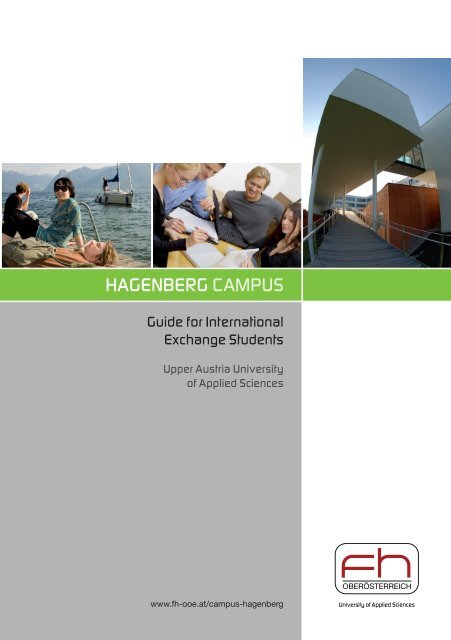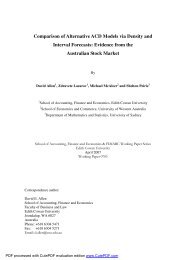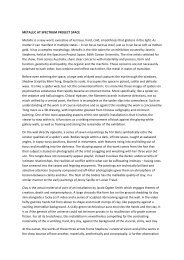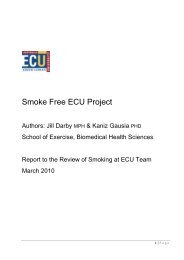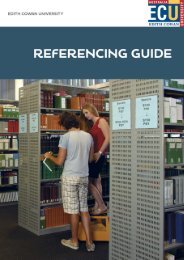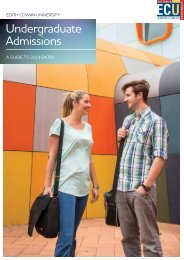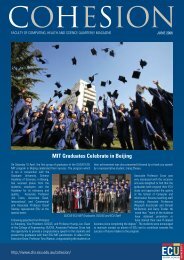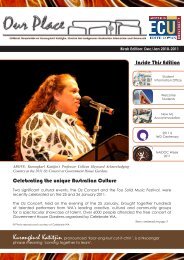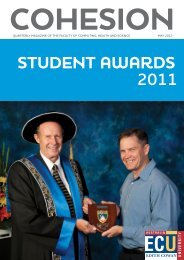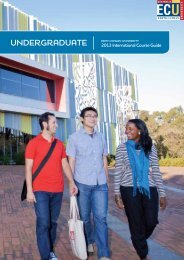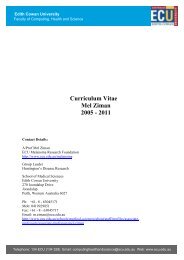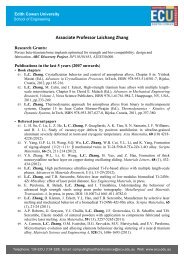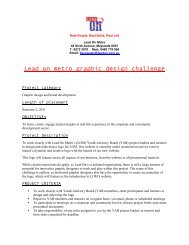Hagenberg campus exchange guide
Hagenberg campus exchange guide
Hagenberg campus exchange guide
You also want an ePaper? Increase the reach of your titles
YUMPU automatically turns print PDFs into web optimized ePapers that Google loves.
HAGENBERG CAMPUS<br />
Guide for International<br />
Exchange Students<br />
Upper Austria University<br />
of Applied Sciences<br />
www.fh-ooe.at/<strong>campus</strong>-hagenberg
Guide for International Exchange Students<br />
Contents<br />
Life as an International Student in Austria<br />
General Information about <strong>Hagenberg</strong> .................................................................................................. 4<br />
Universities of Applied Sciences in Austria - <strong>Hagenberg</strong> Campus ....................................... 5<br />
Our Degree Programs<br />
Bachelor Programs:<br />
Bioinformatics ........................................................................................................................................ 6<br />
Communication and Knowledge Media ................................................................................................ 6<br />
Computer and Media Security ............................................................................................................... 6<br />
Hardware/Software Systems Engineering ............................................................................................. 6<br />
Media Technology and Design ............................................................................................................... 6<br />
Mobile Computing .................................................................................................................................. 6<br />
Software Engineering ............................................................................................................................. 6<br />
Masters Programs:<br />
Digital Media .......................................................................................................................................... 7<br />
Embedded Systems Design ................................................................................................................... 7<br />
Information and Engineering Management (part time) ........................................................................... 7<br />
Mobile Computing ................................................................................................................................. 7<br />
Secure Information Systems .................................................................................................................. 7<br />
Software Engineering ............................................................................................................................. 7<br />
Internationalisation<br />
International Office <strong>Hagenberg</strong> / Contact ............................................................................................... 8<br />
Arrival Dates ............................................................................................................................................ 8<br />
Grading System ...................................................................................................................................... 8<br />
ECTS ....................................................................................................................................................... 8<br />
<strong>Hagenberg</strong> Campus Services and Facilities<br />
Internet and Intranet / Student ID-Card / Library .................................................................................... 9<br />
Pick-up Service / Accommodation ......................................................................................................... 9<br />
Academic Information<br />
Academic Calendar / Types of Classes ................................................................................................ 10<br />
Attendance Policy / Examinations ........................................................................................................ 11<br />
<strong>Hagenberg</strong> Campus Events/Free time activities<br />
Sports & Leisure ................................................................................................................................... 12<br />
Do’s and Don’ts .................................................................................................................................... 13<br />
Essential Practical Information<br />
Survival German for Student Life .......................................................................................................... 14<br />
Registration with the local authorities ................................................................................................... 14<br />
Climate and Clothing ............................................................................................................................. 15<br />
Currency / Monthly Living Costs in <strong>Hagenberg</strong> .................................................................................... 15<br />
Banking Hours / Credit Cards ............................................................................................................... 15<br />
Medical Services and Pharmacies / Emergency Numbers .................................................................... 16<br />
Health Insurance Coverage / Non-emergency Medical Treatment ........................................................ 16<br />
Infrastructures ....................................................................................................................................... 17<br />
Public Transport - Railways/ Discount Rail Travel ................................................................................ 17<br />
Getting to <strong>Hagenberg</strong> ........................................................................................................................... 17<br />
HAGENBERG CAMPUS 2
Statements<br />
International Students in <strong>Hagenberg</strong><br />
I have no words to describe this experience,<br />
these months have been one of my best experiences.<br />
<strong>Hagenberg</strong> is a nice village, the people are<br />
quite friendly, and academically <strong>Hagenberg</strong> is a<br />
very recommendable place to study, I have learned<br />
so much. I miss the landscape, the Austrian<br />
food, the people… I will not forget <strong>Hagenberg</strong> in<br />
my life...<br />
3<br />
Oscar Conde O‘Donnell,<br />
University of Malaga, Spain<br />
I heard great things from some friends about<br />
<strong>Hagenberg</strong> before I came: studying, playing,<br />
partying - it‘s a cool place to study. They have<br />
professional equipment for the students to use,<br />
industry standard software and people who are<br />
there to help out at anytime.<br />
Shayna Quinn,<br />
Wanganui School of Design, NZ<br />
Nice people, great atmosphere – I really enjoyed<br />
my stay in <strong>Hagenberg</strong>.<br />
Sonja Chèvre,<br />
FH Bern, Switzerland<br />
<strong>Hagenberg</strong> is the best combination between<br />
fun and studying. There are a lot of great people<br />
ready to help you or to party with you.... If you<br />
want to have fun, you defi nitely need to come to<br />
<strong>Hagenberg</strong>! I will not forget this experience and<br />
neither will you!<br />
Popescu Cosmin Valentin,<br />
University Babes-Bolyai Cluj-Napoca, Romania<br />
I absolutely loved studying in <strong>Hagenberg</strong> and<br />
would highly recommend the Upper Austria<br />
University of Applied Sciences to any anyone<br />
considering studying there. The teachers and staff<br />
were both very friendly and professional and as<br />
an international student I instantly felt comfortable<br />
on <strong>campus</strong>. What I loved most about the school<br />
was the way that the native Austrian students<br />
really made an effort to make me part of other<br />
student events and activities and often helped to<br />
solve any problems I had.<br />
Johnson Witehira,<br />
Wanganui School of Design, NZ<br />
When I chose <strong>Hagenberg</strong> as my destination<br />
I didn‘t know I was going to one of the most<br />
beautiful landscapes just in the middle of Europe.<br />
It is on a great location as you can travel to<br />
many countries which are relatively close (Czech<br />
Republic, Germany, Poland...). They have a great<br />
College here with the newest technology and nice<br />
and helpful people.<br />
You will also fi nd a lot of student parties at the<br />
Fachhochschule or in Linz where you’ll meet<br />
really awesome people.<br />
For me the best thing from coming here was getting<br />
to know all the different cultures I had around:<br />
Polish, Turkish, Spanish (!), German, Romanian...<br />
and of course Austrian!<br />
Carlos Alonso Pena Osorio,<br />
University of Málaga, Spain<br />
<strong>Hagenberg</strong> is a very quiet and peaceful village<br />
where you can really focus on studying. The<br />
University is professionally equipped so new<br />
opportunities and challenges are available. But<br />
of course it‘s not only about studying - you can<br />
meet wonderful and friendly people here and<br />
learn something about their culture and beautiful<br />
country. I will never regret spending my time here!<br />
Wojciech Kaczmarek,<br />
Wroclaw University of Technology, Poland
Studying in Austria<br />
Life as an International Student<br />
in Austria<br />
Congratulations on your decision to embark on one of life’s great adventures: a period of residence and<br />
study abroad. We hope that your stay here will be a wonderful, unforgettable experience for you.<br />
International <strong>exchange</strong> students the world over usually experience different phases of adjustment during<br />
their stay abroad. At fi rst you will probably see everything through the eyes of a tourist. Everything is new<br />
and exotic. After this stage you get down to the business of living your everyday life, which for some<br />
people is accompanied by a sense of disorientation or culture shock. This is a quite natural phenomenon<br />
when someone is in completely unfamiliar surroundings where everything is new.<br />
If this affects you, please do not hesitate to speak to one of the staff involved in internationalisation. We<br />
have been through this ourselves and will be more than willing to listen and talk with you about it. You<br />
may also fi nd it helpful to bear in mind that this is a phase that will pass and in the meantime try to keep<br />
an open mind and seek contact with other people.<br />
General Information about <strong>Hagenberg</strong><br />
<strong>Hagenberg</strong> is an idyllic town in the beautiful<br />
Mühlviertel, in the heart of Upper Austria. In the<br />
last decade, <strong>Hagenberg</strong> has established itself as<br />
an internationally recognized center for computing<br />
and software development. Several high-tech<br />
companies and research centers have chosen to<br />
settle in the Software Park in <strong>Hagenberg</strong>.<br />
An outstanding mix of the most modern technology<br />
combined with the picturesque setting of<br />
the <strong>Hagenberg</strong> castle gives the town its unique<br />
fl air. Located just 20km north of Linz, <strong>Hagenberg</strong><br />
offers focused degree programs in the fi eld of<br />
Information Technology away from the bustle of<br />
the big city, yet with easy access to the resources<br />
of the provincial capital.<br />
The University of Applied Sciences is housed in a<br />
futuristic building equipped with the most modern<br />
technology. More than 1300 students are currently<br />
attending the <strong>campus</strong> in <strong>Hagenberg</strong> to complete<br />
a degree in the fi elds of Information Technology<br />
and Media.<br />
HAGENBERG CAMPUS 4
Studying in Austria<br />
Universities of Applied Sciences<br />
in Austria<br />
Universities of Applied Sciences – in German “Fachhochschulen” (FH) – are relatively new in Austria: the<br />
law authorizing their introduction was passed in the early 90s and the fi rst degree programs were launched<br />
in autumn 1994. Currently over 100 different degree programs are offered at Universities of Applied<br />
Sciences in Austria. The aim of Austria’s Universities of Applied Sciences is to provide a more practiceoriented<br />
education to complement the range of courses offered by traditional universities. Education is<br />
founded on academic, research-based principles; Universities of Applied Sciences are required to carry<br />
out applied research and development, which are integrated into the curricula. Students are involved in<br />
R&D projects at an early stage of their studies.<br />
Keeping in line with the Bologna Declaration, however, the transition to the bachelor/master system at the<br />
Upper Austria University of Applied Sciences has already been completed in nearly all degree programs.<br />
The transition does not only serve to improve international comparability and recognition, but also leads<br />
to a greater degree of fl exibility for the students.<br />
<strong>Hagenberg</strong> Campus<br />
The academic programs in <strong>Hagenberg</strong> are divided<br />
into three main fi elds:<br />
>> Software, Systems and Media<br />
Each program has a clearly defi ned and industryoriented<br />
focus. These focuses include such areas<br />
as software development, hardware and software<br />
interfaces, applications in the fi eld of mobile<br />
devices and security-related aspects of modern<br />
communication, in addition to the technical, organizational,<br />
and design-related issues in the fi eld<br />
of media. Courses in business administration and<br />
project management complement the curricula,<br />
resulting in graduates who are highly qualifi ed for<br />
leading positions within the IT and media industry.<br />
5<br />
The Structure of our Degree Programs<br />
The Bachelor Programs (three years, 180 ECTS)<br />
require a one term professional internship during<br />
which students work in companies or research institutes<br />
in Austria or abroad. Training in soft skills<br />
is an additional feature of our programs.<br />
The Masters Programs (two years, 120 ECTS)<br />
offer in-depth specialization in specifi c fi elds with<br />
emphasis on strategic thinking and problemsolving<br />
skills.
<strong>Hagenberg</strong> Campus<br />
Our Degree Programs<br />
Bachelor Programs:<br />
Bioinformatics<br />
This undergraduate degree program offers a modern and industry-oriented education in the fi elds of<br />
software development, database technologies, 3D modeling/simulation of biological processes and a<br />
basic understanding of processes in the fi elds of biology, genetics and biopharmacy.<br />
Communication and Knowledge Media<br />
This undergraduate program teaches the design and use of media in corporate communication,<br />
computer-enhanced learning, and knowledge management. Graduates plan the use of media in processes<br />
of information, communication, learning, knowledge, creation and work and are responsible<br />
for quality management concerning the effective use of media in these processes.<br />
Computer and Media Security<br />
The undergraduate degree program Computer and Media Security provides an education in all forms<br />
of security measures in connection with the organization and operation of computer systems and<br />
networks as well as the transfer, storage and archiving of electronic data.<br />
Hardware/Software Systems Engineering<br />
Graduates of this degree program are highly skilled in the computer-aided design of integrated VLSI<br />
circuits, in applying microcontrollers and peripherals, in writing effi cient software, and in optimizing<br />
systems as a whole. A further focus in this program is the knowledge in electronics, computer architecture,<br />
communications engineering and software development.<br />
Media Technology and Design<br />
Achieving the perfect combination of the latest technology, content and design is essential for success<br />
in the fi eld of digital media. This program provides students with the technical expertise, design<br />
knowledge and communication skills to face this challenge. A solid education and experience with<br />
professional equipment enable students to realize innovative concepts.<br />
Mobile Computing<br />
The goal of the undergraduate program Mobile Computing is to educate people who, equipped with<br />
substantial knowledge in the fi elds of communications technology, informatics and application development,<br />
can professionally manage projects in this future technology both technically and organizationally.<br />
Software Engineering<br />
In this undergraduate program students are trained to recognize, analyze, model, implement or improve<br />
business and technical processes in terms of appropriate software. The aim is to enable them<br />
to develop software with the most modern methods of software technology for all areas of application.<br />
HAGENBERG CAMPUS 6
Masters Programs:<br />
7<br />
Digital Media<br />
The Masters program Digital Media allows students to apply an individual focus to their studies of<br />
media technology and design. In addition to obtaining an education on a professional level, students<br />
are encouraged to develop their capacity for independent work, perfect their methodology, and hone<br />
their communication skills.<br />
Embedded Systems Design<br />
This Masters Program is an interdisciplinary educational and research program which covers all<br />
aspects of embedded systems. Embedded systems are ubiquitous in daily life, covering for instance<br />
products such as handheld devices, medical devices and automobiles. They combine hard and<br />
software in real-time applications. The complexity of such a system requires skills in system design,<br />
verifi cation and simulation in addition to embedded software development, communication engineering<br />
and VLSI chip-design.<br />
Information and Engineering Management (part time)<br />
The goal of this Masters program is to give graduates of typical information technology studies –<br />
especially those in software engineering, informatics, etc. – the opportunity to further develop themselves<br />
in the area of IT management (Department Head of EDP, IT Manager, CIO, etc.), with particular<br />
emphasis placed on the new circumstances inherent in such positions of management.<br />
Mobile Computing<br />
The Masters program “Mobile Computing” offers the opportunity to specialize in different areas<br />
dealing with software development for mobile applications. Key aspects of the education are the guidance<br />
towards a systematic approach to problem solving, an autonomous working style, and further<br />
training of social skills.<br />
Secure Information Systems<br />
This program offers a chance for individual in-depth studies and specialization in varied areas of IT<br />
security. Its main focus is on practical training as well as independent and systematic work with an<br />
emphasis on the development of communication skills. The modules Computer & Network Forensics,<br />
Cryptography, Advanced Networking and Law & Experts can be combined individually.<br />
Software Engineering<br />
The Masters program Software Engineering offers students a profound and modern education in all<br />
aspects relevant to complex software systems (e.g. architecture, security, and fault tolerance) and to<br />
the main instances of such systems (e.g. heterogeneous, distributed, and mobile).
<strong>Hagenberg</strong> Campus<br />
Internationalisation<br />
The International Offi ce is in charge of international<br />
relations within our <strong>Hagenberg</strong> Campus.<br />
The Upper Austria University of Applied Sciences<br />
maintains contacts to partner universities on<br />
almost all continents. Our International Offi ce<br />
facilitates <strong>exchange</strong>s of students and academic<br />
staff.<br />
Internationalisation is changing the face of business<br />
today and must therefore play an integral<br />
role in the education of future business people.<br />
<strong>Hagenberg</strong> Campus therefore has a fi rm commitment<br />
to providing its students with opportunities<br />
to broaden their horizons on an international level,<br />
not least by encouraging them to complete part<br />
of their studies abroad, either at a partner institution<br />
or by doing their internships abroad.<br />
In addition to this, courses in various foreign<br />
languages and cultures taught almost exclusively<br />
by native speakers, frequent international<br />
faculty <strong>exchange</strong>s, and the increasing number of<br />
courses in other subjects held in English, encourage<br />
students to accept English as a language<br />
of everyday communication while gaining insight<br />
into different cultures.<br />
The presence of foreign <strong>exchange</strong> students also<br />
makes an important contribution to the internationalisation<br />
of the <strong>campus</strong> environment and<br />
students are encouraged to benefi t from this to<br />
the full by taking part in the Buddy System and<br />
generally seeking contact with students from<br />
other cultures.<br />
Contact<br />
>> International Offi ce <strong>Hagenberg</strong><br />
Christina Huber-Beran<br />
Head of the International Offi ce<br />
Phone: +43 (0)7236 3888-1601<br />
Fax: +43 (0)7236 3888-2199<br />
christina.huber-beran@fh-hagenberg.at<br />
Arrival Dates<br />
Exact arrival dates for specifi c semesters can be<br />
found on the incoming students’ pages of our<br />
website and are also given in the welcome letter<br />
that we send to students whose applications have<br />
been accepted.<br />
Grading System and ECTS<br />
The Austrian education system works with 5<br />
grades:<br />
Austrian Grade Equivalent<br />
sehr gut (1) excellent<br />
gut (2) very good<br />
befriedigend (3) satisfactory<br />
genügend (4) sufficient<br />
nicht genügend (5) fail<br />
Usually 50% of available points have to be obtained<br />
to pass an exam, but professors can define<br />
their own assessment criteria.<br />
ECTS<br />
ECTS (“European Credit Transfer System”)<br />
credits are a numerical value (between 1 and 60)<br />
allocated to course units to denote the student<br />
workload required to complete them. They refl ect<br />
a quantity of work required by each course unit<br />
in relation to the total quantity of work necessary<br />
to complete a full year of academic study at the<br />
institution that includes, lectures, practical work,<br />
seminars, tutorials, fi eldwork and private study as<br />
well as assessment activities. The ECTS is thus<br />
based on a full student workload and not limited<br />
to contact hours only. The basic allocation of academic<br />
credits in ECTS is 60 credits for a full year<br />
of study, 30 credits for a semester, or 20 credits<br />
per term.<br />
Credits are awarded only when the course has<br />
been completed and all required examinations<br />
have been passed. In other words, students do<br />
not get ECTS credits simply for attending classes<br />
or spending time abroad, but must fulfi l the<br />
assessment requirements of the host institution<br />
to demonstrate that they satisfy the specifi ed<br />
learning objectives for the course unit.<br />
HAGENBERG CAMPUS 8
<strong>Hagenberg</strong> Campus<br />
Services and Facilities<br />
Internet and Intranet<br />
Students have unlimited free access to the Internet<br />
from numerous computers throughout the<br />
University building. Every student is also linked to<br />
the intranet and given a personal e-mail account.<br />
Student ID Card<br />
At the secretary´s offi ce, you will get your student<br />
ID card which contains your student number. The<br />
ID card also works as a key to the rooms where<br />
students have free access.<br />
These are: student working rooms, the computer<br />
labs as well as other labs in which you might be<br />
working throughout the semester.<br />
IT information<br />
Login Procedure<br />
Before you can log in for the fi rst time, you need<br />
to register with the <strong>campus</strong> IT system. After registration<br />
you will receive your student ID.<br />
In order to log in to your personal account, you<br />
have to enter a user name and a password.<br />
Web Mail System<br />
Each student is provided with a defi ned e-mail<br />
address. It is a combination of your registration<br />
number and “@fh-hagenberg.at”.<br />
In order to log in to the web mail system, you<br />
have to start the browser fi rst and then link to<br />
http://webmail.fh-hagenberg.at.<br />
Pick-up Service<br />
Students who arrive by train or airplane can be<br />
picked up by our students.<br />
9<br />
Library<br />
All students will be issued student ID cards enabling<br />
them to withdraw books from the library at<br />
<strong>Hagenberg</strong> Campus. Further information on the<br />
use of the library will be provided during the fi rst<br />
days in <strong>Hagenberg</strong>.<br />
Accommodation<br />
Student housing is available nearby, ranging from<br />
on-<strong>campus</strong> halls of residence to private on-<strong>campus</strong><br />
as well as off-<strong>campus</strong> accommodation. If you<br />
would like assistance arranging accommodation<br />
please contact the International Offi ce (the accommodation<br />
form can be downloaded from our<br />
website). More information about the student hall<br />
of residence is available at www.studentenwerk.<br />
at. There you will fi nd information about current<br />
rates and facilities. Please note that a security deposit<br />
in the amount of the monthly rent has to be<br />
paid in advance. The fi rst month‘s rate will have<br />
to be paid within the fi rst days after arrival!<br />
There are also private rooms and apartments<br />
available for rent in <strong>Hagenberg</strong> and the surrounding<br />
area. For more information contact the<br />
municipality:<br />
>> Marktgemeinde <strong>Hagenberg</strong><br />
A-4232 <strong>Hagenberg</strong>, Kirchenplatz 5a<br />
Phone: +43 7236 2318, Fax: +43 7236 2318-3<br />
gemeinde@hagenberg.ooe.gv.at<br />
www.oberoesterreich.at/hagenberg
<strong>Hagenberg</strong> Campus<br />
Academic Information<br />
Although the primary language of instruction at <strong>Hagenberg</strong> Campus is German, as part of our commitment<br />
to internationalisation an increasing number of courses are offered in English. Courses in German<br />
are available to foreign <strong>exchange</strong> students with suffi cient command of the German language. A catalogue<br />
of courses currently taught in English is available on request.<br />
Academic Calendar<br />
<strong>Hagenberg</strong> Campus has an academic year<br />
divided into two semesters.<br />
>> Fall Semester:<br />
Beginning of October to the middle of<br />
February<br />
>> Spring Semester:<br />
Beginning of March to the middle of July<br />
>> Examination period:<br />
End of January to Mid-February (Fall<br />
Semester)<br />
End of June to Mid-July (Spring Semester)<br />
>> Breaks:<br />
Christmas (2 weeks), February (1 to 4 weeks),<br />
Easter (1 week), Summer holidays in July/<br />
August/September (12 weeks).<br />
January 1 New Years Day – Neujahrstag<br />
January 6 Epiphany – Hl. Drei Könige<br />
May 1 Labor Day – Tag der Arbeit<br />
October 26 Austrian National Holiday –<br />
Nationalfeiertag<br />
November 1 All Saints’ Day - Allerheiligen<br />
December 8 Immaculate Conception –<br />
Maria Empfängnis<br />
>> The following church holidays are also public<br />
holidays in Austria:<br />
Ascension Day Christi Himmelfahrt<br />
Whitsuntide Pfingsten<br />
Corpus Christi Fronleichnam<br />
Assumption Maria Himmelfahrt<br />
Easter Monday Ostermontag<br />
Types of Classes<br />
While some subjects are presented as traditional<br />
lectures, others are taught in the form of seminars,<br />
project work and skills practice or a combination<br />
of these methods<br />
Seminars and Workshops<br />
These are classes in which students research<br />
topics and present and discuss them within a<br />
relatively small group. These can, in some cases,<br />
augment project work.<br />
Block Instruction<br />
In some cases – primarily in the case of seminars<br />
and workshops – instruction does not take place<br />
weekly, but is instead delivered in blocks of more<br />
intensive instruction (e.g. one block every two<br />
weeks or even one block per term). Blocks can<br />
also be held as immersion courses on weekends.<br />
Excursions<br />
Some courses occasionally include excursions,<br />
and attendance is generally obligatory. Any costs<br />
that arise for entrance fees, accommodation or<br />
other expenses are paid by the students.<br />
Project Work<br />
These are not theoretical projects but “real” work<br />
– with all the responsibilities that go along with<br />
it and have therefore proven popular with our<br />
<strong>exchange</strong> students in recent semesters.<br />
HAGENBERG CAMPUS 10
Students are supervised and <strong>guide</strong>d by a faculty<br />
member but most of the time they work on their<br />
own. Finally, the teams have to present their<br />
results to both their supervising faculty member<br />
and the company.<br />
The main aim of these projects is to train the<br />
students in teamwork. Teamwork and team spirit<br />
are key elements of our University’s philosophy<br />
– students learn to work together rather than<br />
competing with one another.<br />
Attendance Policy<br />
Students are expected to attend and participate<br />
fully in all lectures, seminars and projects in which<br />
they have elected to take part. Attendance lists<br />
may be kept at the discretion of the individual<br />
faculty members.<br />
The examination period is from the end of January<br />
to mid February in the fall semester and from<br />
the end of June to mid July in the spring semester.<br />
Students will be informed of the date, place<br />
and time of examinations, and given details of the<br />
examination procedure by the course instructor in<br />
due course.<br />
The lectures are assessed by a fi nal course examination.<br />
A number of individual exams are also<br />
permissible should the didactic concept render<br />
11<br />
this possible. The academic achievement for<br />
tutorials, seminars, projects, integrated courses,<br />
laboratory and behaviour training is usually subject<br />
to continuous assessment during the course<br />
(course immanent examination).<br />
Examinations<br />
In general, registration for a course at the beginning<br />
of term counts as registration for the examination.<br />
The only exceptions are changes made<br />
to the Learning Agreement within the prescribed<br />
period. To complete a term successfully, students<br />
must be examined for every course they have<br />
attended. Examinations may take various forms:<br />
formal written or oral examinations, assessment<br />
of coursework, a combination of the two or other<br />
means such as presentations during seminars,<br />
etc.<br />
Students are expected to be present to sit exams<br />
here in <strong>Hagenberg</strong>. However, in exceptional<br />
cases (e.g. clashing semester dates between<br />
home university and <strong>Hagenberg</strong>, urgent appointments,<br />
illness), when a student needs to leave<br />
<strong>Hagenberg</strong> Campus earlier, it is possible to take<br />
an exam by fax. However, this solution is not the<br />
norm and if there is such a necessity, we need to<br />
have confi rmation of it from the student’s home<br />
university or employer. Moreover, all details have<br />
to be discussed with the respective professor<br />
here in <strong>Hagenberg</strong> before leaving.
<strong>Hagenberg</strong> Campus<br />
Events/Free Time Activities<br />
<strong>Hagenberg</strong> Campus organises a varied program of events ranging from the legendary “Summer Fest”, the<br />
“Bierkistenrennen” (beer race) or the “<strong>Hagenberg</strong> Highland Games” and to more formal events such as<br />
the “Study Abroad Fair” (incoming students have the opportunity to present their home universities) and<br />
“<strong>Hagenberg</strong> Campus Ball” in the fall semester to which formal evening dress must be worn. Staff versus<br />
students soccer matches are also very popular on our <strong>campus</strong>!<br />
Sports & Leisure<br />
Of course there’s more to student life in <strong>Hagenberg</strong><br />
than just studying – there are plenty of leisure<br />
time activities to pursue here as well. Movie<br />
nights and student parties regularly take place on<br />
<strong>campus</strong>.<br />
Especially those interested in sports can fi nd a<br />
variety of suitable facilities in <strong>Hagenberg</strong>. - You<br />
can register at the FH-Sports Club (FH-Sportverein)<br />
which offers the following sports activities:<br />
Dance, Football, Ultimate Frisbee, Volleyball,<br />
Basketball, Climbing, Fitness Center, Running,<br />
Kickboxing and Back-strengthening Exercises.<br />
Registration for the Sports Club is possible<br />
during the fi rst two weeks of each semester. More<br />
information about registration and prices can be<br />
obtained from the FH-Sports Club at<br />
>> www.fh-ooe.at/sportverein.<br />
In the winter, the mountains offer wonderful<br />
slopes for skiing and snowboarding in the Mühlviertel<br />
as well as in the south of Upper Austria<br />
(Salzkammergut) and in the neighbouring provinces<br />
Salzburg and Styria. In the fall semester we<br />
usually organize a skiing day with our <strong>exchange</strong><br />
students.<br />
There are bus connections to Linz, the capital of<br />
Upper Austria, on a daily basis. A bus trip to Linz<br />
takes about 40 minutes, by car it only takes about<br />
20 minutes. There are a number of museums and<br />
other cultural landmarks in Linz, which will be the<br />
offi cial European Cultural Capital in 2009.<br />
HAGENBERG CAMPUS 12
Living in Austria<br />
Do´s and Don´ts<br />
Austria is a German speaking country. The current<br />
students’ generation is the fi rst that received a<br />
good general education in English from primary<br />
school onwards. However, many of the older<br />
people don’t speak any foreign languages. In tourist<br />
areas many people do in fact speak English<br />
but elsewhere most shop assistants and waiters<br />
speak very little English if any. Especially the older<br />
generation may consider it arrogant to expect<br />
everyone to speak English. Showing respect for<br />
Austrian culture by learning a few key words of<br />
German can help make everyday communication<br />
run more smoothly.<br />
13<br />
“Bitte” please<br />
“Danke” thank you<br />
“Entschuldigung” excuse me /<br />
pardon me<br />
“Guten Morgen” good morning<br />
“Grüss Gott” hello (formal)<br />
“Guten Abend” good evening<br />
“Auf Wiedersehen” goodbye<br />
When entering shops, especially smaller ones,<br />
but even larger ones, greet the salesperson. A<br />
“Grüss Gott” is simply expected of well-mannered<br />
persons. This even applies to outdoor markets.<br />
In Austria it is traditional that academic degrees<br />
and some professional qualifi cations are used as<br />
titles. Especially in academic environments many<br />
Austrians are quite sensitive about this and feel<br />
insulted if not addressed by their titles. Although<br />
many of the academic staff at <strong>Hagenberg</strong> Campus<br />
prefer to be addressed simply as “Herr A” or<br />
“Frau X”, this is not the norm. Whenever you are<br />
in a company, doing some project work however,<br />
always pay attention to the company culture.<br />
When in doubt, it is always better to use the title<br />
than to omit it. If it is not common in the company<br />
to use titles you will be told so. Whenever talking<br />
to staff of a traditional university never forget to<br />
use their title.<br />
Austrians usually take their shoes off as soon as<br />
they enter someone’s home. Most of the time the<br />
host responds by telling you not to do so; it is<br />
however better to take them off nevertheless as<br />
the host’s request to leave them on might be just<br />
politeness. If other guests are present the easiest<br />
way is to do as they do to get it right.<br />
Austrian waiters generally expect tips. This applies<br />
not only in restaurants but also in cafés and<br />
pubs. It is not customary to leave the tip on the<br />
table when leaving but to inform the waiter when<br />
paying what he should keep. For example, if the<br />
bill comes to € 9.20, you should round it up and<br />
tell him “make it 10”. In good restaurants Austrians<br />
tip 10% for particularly good service.<br />
When invited to someone’s home for a party or<br />
a meal it is always wise to bring along a little<br />
present. Austrians usually bring along a bottle of<br />
wine, sweets, fl owers, etc.<br />
Never take purchases you have made elsewhere<br />
into shops selling similar products in Austria. You<br />
may be asked to show the contents of your shopping<br />
bag or backpack at the checkout and it can<br />
lead to diffi culties if you have products in your<br />
bag that are also sold in the shop concerned.<br />
Many large stores provide lockers in which you<br />
can leave your shopping before you enter.<br />
Under Austrian law it is compulsory to separate<br />
your rubbish for recycling. Special bins are provided<br />
for glass, metal, plastic packaging, organic<br />
waste, recyclable paper and remaining non-recyclable<br />
waste. Additionally, all packaging materials<br />
have to be washed before being thrown away.<br />
In order to maintain a harmonious relationship<br />
with your neighbours, landlord and even to avoid<br />
problems with the authorities, it is important that<br />
you comply with this law.
Living in Austria<br />
Essential Practical Information<br />
Survival German for Student Life<br />
This short glossary of German terms related to life<br />
at <strong>Hagenberg</strong> Campus should help you in your<br />
orientation as a student here.<br />
Bibliothek library<br />
Endnote final mark / grade<br />
Fachbereich academic department<br />
Fachbereichsleiter head of department<br />
HBL full-time professor<br />
Hörsaal (HS) lecture hall<br />
IF student union at<br />
<strong>Hagenberg</strong> Campus<br />
IT / EDV Raum IT room (computer<br />
room)<br />
Jahrgangssprecher student representative<br />
of each course and year<br />
Klausur written examination<br />
Labor laboratory (room)<br />
Laborübung laboratory (class)<br />
Lehrveranstaltung<br />
(LVA)<br />
course<br />
Mensa university cafeteria<br />
Mündliche Prüfung oral examination<br />
NBL part-time lecturer<br />
Note mark / grade<br />
Prüfung examination<br />
Sekretariat administrative<br />
assistant’s offi ce<br />
Seminarraum (SR) seminar room<br />
Standortsprecher student representative<br />
of <strong>Hagenberg</strong> Campus<br />
Studiengang academic program<br />
Studiengangsleiter head of studies<br />
Stundenplan timetable<br />
Studienplan learning agreement<br />
Übung practice class<br />
Vorlesung (VL/VO) lecture<br />
Registration with the local authorities<br />
EU Citizens:<br />
For students from EU countries and Switzerland,<br />
a valid passport is suffi cient.<br />
Non-EU Citizens:<br />
Non-EU citizens have to contact the local Austrian<br />
Consulate/Embassy in their home country<br />
for details regarding current visa regulations for<br />
Austria. In order to enter Austria and to live here,<br />
you have to apply for a residence permit. The<br />
following documents are required:<br />
>> Passport (has to be valid for at least one more<br />
year)<br />
>> Certifi cate of Birth<br />
>> Letter of Confi rmation issued by the university<br />
>> Proof of health insurance coverage (confi rmation<br />
of registration with the Upper Austrian<br />
Health Insurance Company (OÖGKK)<br />
>> Bank statement (Austrian bank account<br />
required)<br />
>> Police clearance certifi cate<br />
>> 1 Passport-sized photo<br />
Please note that the residence permit is NOT a<br />
work permit for Austria. The Letter of Confi rmation<br />
for the embassy will be sent to you by the<br />
International Offi ce.<br />
Under Austrian law all changes of address have<br />
to be registered with the local authority within<br />
three working days; of course this also applies<br />
to foreign <strong>exchange</strong> students. In order to register<br />
you will need to take your passport (with a valid<br />
visa if applicable) and an offi cial registration form,<br />
“Meldezettel” which will be distributed and fi lled<br />
in directly at your arrival at the dormitory.<br />
After registration you will be given an offi cial<br />
print-out of your registration details which should<br />
be kept safely and will be needed along with<br />
a second “Meldezettel” when registering your<br />
departure.<br />
HAGENBERG CAMPUS 14
15<br />
“Anmeldebescheinigung“<br />
– Confirmation of Registration<br />
(For Nationals of EU/EEA countries only!)<br />
If you are staying in Austria for longer than 3<br />
months you have to register with the competent<br />
municipal authority (Bezirkshauptmannschaft<br />
Freistadt) within the fi rst 3 months of<br />
your stay and you will receive a confi rmation<br />
of registration.<br />
This registration is necessary in addition to<br />
the registration according to the registration<br />
act (Meldezettel). In case of non-compliance<br />
with this regulation a fi ne may be imposed.<br />
The International Offi ce will assist international<br />
students in this registration process.<br />
Climate and Clothing<br />
Austria gets very cold in the winter with temperatures<br />
sometimes dropping below -10˚C, so<br />
we recommend that you bring warm clothes<br />
and shoes with good sturdy soles for the winter<br />
semester. However, although you may associate<br />
Austria with winter sports, we often enjoy warm<br />
summers with temperatures sometimes up to and<br />
even above 30˚ C.<br />
Currency<br />
Since the beginning of 2002, Austria’s currency<br />
has been the Euro (€). 1 Euro = 100 cents<br />
Monthly Living Costs in <strong>Hagenberg</strong><br />
A student needs about € 400-560 per month.<br />
For example:<br />
Rent (inclusive) ........................... € 170 - 280<br />
Food .................................................... € 155<br />
Entertainment ....................................... € 75<br />
Other expenses .................................... € 40<br />
Total € 495 - 555<br />
Typical Prices of Everyday Products<br />
1 liter milk .......................................... € 1.00<br />
1 loaf of bread .................................... € 1.80<br />
100 g cheese ...................................... € 1.20<br />
1 yoghurt ............................................ € 0.50<br />
½ liter beer (supermarket) .................. € 0.80<br />
150 g ham .......................................... € 1.30<br />
1 kg apples ........................................ € 1.80<br />
1 liter of orange juice .......................... € 1.00<br />
500 g pasta ......................................... € 1.00<br />
375 g cereal ....................................... € 2.20<br />
Banking Hours<br />
Banking hours in Austria vary, but as a general<br />
rule banks open between 8:00 and 16:30 Monday<br />
to Friday and often close for one or two hours<br />
at lunchtime. Many banks also close on Friday<br />
afternoons.<br />
You will need to check the exact opening hours<br />
of the bank of your choice, as the above is just a<br />
general <strong>guide</strong>line.<br />
Student accounts usually are free in Austria, for<br />
opening an account you will need your passport<br />
and a confi rmation from our university.<br />
Credit Cards<br />
An increasing number of businesses in Austria accept<br />
major international credit cards such as Visa<br />
and Mastercard, although many companies only<br />
accept these for purchases above a certain price.
© Photos: OÖ.Tourismus,<br />
www.bilderbox.com,<br />
Upper Austria University of<br />
Applied Sciences,<br />
Michael Frühmann,<br />
Andrea Groisböck<br />
Medical Services and Pharmacies<br />
Austria boasts an excellent network of pharmacies<br />
and medical practitioners. Pharmacies<br />
operate a rota system for night and Sunday duty.<br />
When a pharmacy is closed a notice is displayed<br />
giving details of the nearest pharmacies that are<br />
open.<br />
Emergency Numbers<br />
Ambulance (Rettung) /<br />
Emergency Doctor (Notarzt): ....... Phone 144<br />
Fire Brigade (Feuerwehr): ............ Phone 122<br />
Police (Polizei/Gendarmerie): ...... Phone 133<br />
Mountain rescue service<br />
(Bergrettung): ............................... Phone 140<br />
Information on local medical emergency services<br />
is available from local police stations as well as in<br />
telephone directories and daily newspapers.<br />
Health Insurance Coverage<br />
Austria has an excellent public health care system.<br />
If you are staying in Austria for less than one<br />
year, you should fi nd out if there is an agreement<br />
between your home country and Austria regarding<br />
health insurance. Between EU countries there is<br />
reciprocal health insurance system. You need to<br />
bring a proof of health insurance coverage of your<br />
own insurance company or your health insurance<br />
card before coming to Austria in order to ensure<br />
that you will be treated in Austria in the event of<br />
any illness without having to pay anything yourself.<br />
At any event, international <strong>exchange</strong> students<br />
who are non-EU citizens must obtain full health<br />
insurance in Austria with the Upper Austrian<br />
Health Insurance Company (OÖGKK) for a fee of<br />
currently € 22.29 per month. Students can insure<br />
themselves for as long (or as short) as necessary.<br />
To register for insurance with OÖGKK you need<br />
the following:<br />
>> Confi rmation of enrolment at <strong>Hagenberg</strong><br />
Campus (Inskriptionsbestätigung)<br />
>> your Residence Registration („Meldezettel“)<br />
>> proof of health insurance coverage in your<br />
home country during the last 12 months<br />
The insurance covers hospital stays, medical<br />
attention and service all free of charge (with a<br />
medical insurance record card available at the<br />
OÖGKK), reduced prescription charges of currently<br />
€ 4.70 each.<br />
Non-emergency Medical Treatment<br />
If you need non-emergency medical treatment<br />
and are from an EU country that has a reciprocal<br />
health insurance agreement with Austria, you<br />
must take your passport and a proof of health insurance<br />
coverage of your own insurance company<br />
or your health insurance card from your home<br />
country to the general medical practitioner or the<br />
medical specialist whom you like to see. These<br />
documents entitle you to receive most medical<br />
treatment free of charge from doctors that have a<br />
contract with this regional public health insurance<br />
organisation. Such doctors usually advertise with<br />
the words “alle Kassen” on the wall plates outside<br />
their offi ces and it is to them that you should go<br />
for non-emergency medical treatment during<br />
consulting hours.<br />
If you are from a country that does not have such<br />
a reciprocal health care agreement with Austria,<br />
you must take your passport and your health<br />
insurance card (e-card) to the general medical<br />
practitioner or the medical specialist whom you<br />
like to see. After your registration with the Upper<br />
Austrian Health Insurance Company (OÖGKK<br />
in Pregarten, near <strong>Hagenberg</strong>) it usually takes 2<br />
weeks until you receive your e-card, in case of<br />
medical attention is required before you have got<br />
your e-card, use the confi rmation of registration<br />
(Meldezettel) as a substitute for the e-card.<br />
HAGENBERG CAMPUS 16
Important Vocabulary<br />
17<br />
Praktischer Arzt general medical practitioner<br />
Facharzt medical specialist<br />
Zahnarzt dental surgeon<br />
Frauenarzt gynaecologist<br />
Augenarzt eye specialist<br />
Urologe urologist<br />
HNO Arzt ear, nose and throat<br />
specialist<br />
Ordination medical practice<br />
Sprechstunden consulting hours<br />
Termin appointment<br />
Nach Vereinbarung by appointment<br />
Schmerzen pains<br />
Behandlung treatment<br />
Rezept prescription<br />
Apotheke pharmacy<br />
Infrastructure<br />
Post Offi ce <strong>Hagenberg</strong><br />
Opening Hours Monday – Friday: 7.30 am - 12 am<br />
and 2 pm - 5 pm, Tuesday afternoon closed<br />
Townhall<br />
Marktgemeinde <strong>Hagenberg</strong><br />
4232 <strong>Hagenberg</strong>, Kirchenplatz 5a<br />
Phone: +43 (0)7236 2318, Fax: -3<br />
e-mail: gemeinde@hagenberg.ooe.gv.at<br />
Pharmacy<br />
Hauptstraße 90, 4232 <strong>Hagenberg</strong><br />
Phone: +43 (0)7236 20683, Fax: -15<br />
Opening hours: Monday-Friday 8 am - 12.30 am<br />
and 2 pm - 6 pm, office@apothekehagenberg.at,<br />
>> www.apothekehagenberg.at<br />
General Practitioner<br />
Dr. Tanja Reichel<br />
Phone: +43 (0)7236 60 98 or +43 (0)664 4386561<br />
Hauptstraße 90, 4232 <strong>Hagenberg</strong><br />
Dr. Wolfgang Fürlinger<br />
Phone: +43 (0)7236 24 62 or +43 (0)676 4056715,<br />
Tragweinerstraße 29, 4230 Pregarten<br />
Public Transport<br />
Railways<br />
For information on Austria’s Federal Railway<br />
services see their homepage: >> www.oebb.at<br />
Discount Rail Travel<br />
ÖBB customer card “ÖBB-Vorteilscard
FH OÖ - Upper Austria University of Applied Sciences <strong>Hagenberg</strong> Campus<br />
Softwarepark 11 4232 <strong>Hagenberg</strong>/Austria Phone: +43 (0)7236 3888-1601<br />
Fax: +43 (0)7236 3888-2199 international@fh-hagenberg.at www.fh-ooe.at


